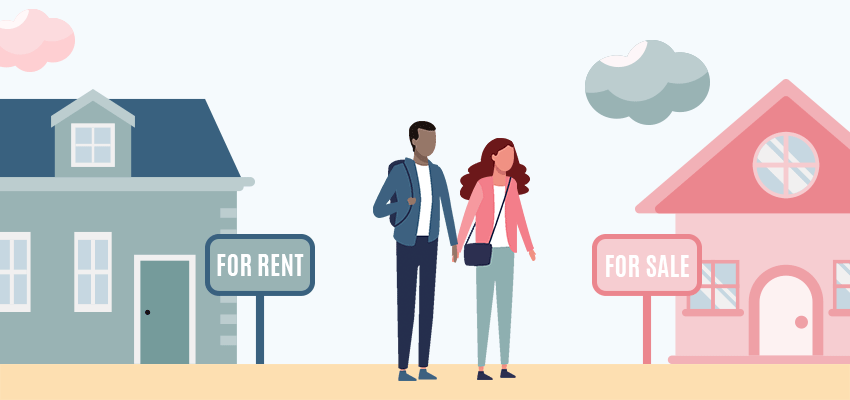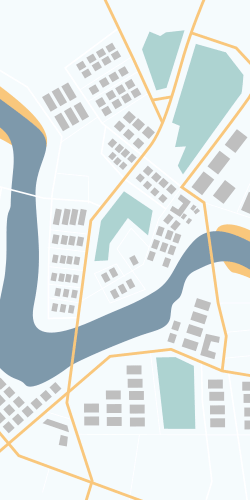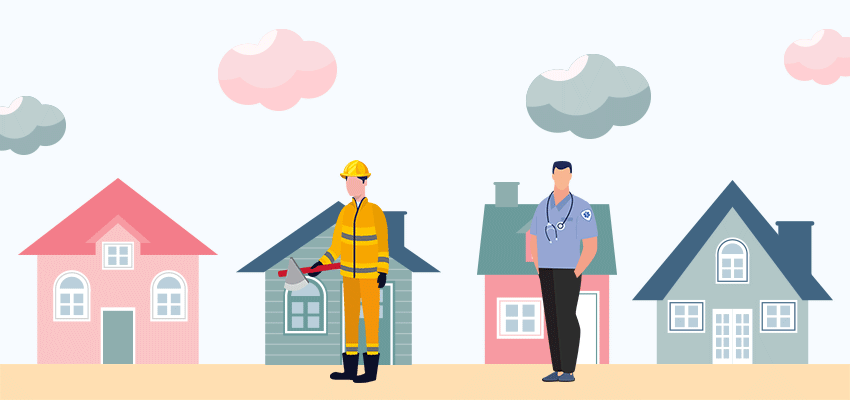Getting Started With Buying a Home
- When buying a home, it is important to do your research and be practical.
- Don’t be afraid to seek out advice from government programs and other agencies during your homebuying process.
Welcome to our homebuying guide for those who don’t know all the ins and outs of buying a home. It can be an adventure or an ordeal, so let’s try to make it a good experience for you. (see this article and more resources at our financial education site, Enrich: https://greencountryfcu.enrich.org/start/start-here-buying-a-home)
We’ll talk about buying, renting, mortgages, government programs, mistakes to avoid, and more. Buying a house is a big decision, and you don’t want to miss any opportunity or find yourself in a compromising position.
Rent or Buy?
First, let’s determine whether you should rent or buy.
There are many calculators online to help. These tools ask you how much you can afford, your anticipated loan type, expected tax and insurance rates, loan term, and monthly HOA.
However, it’s not all about how much you can afford. Prospective homeowners might also ask questions regarding their current and future lifestyle, as well as their financial goals.
Here are some questions you might ask yourself:
- Do you want to bounce around a lot? If so, you may consider renting.
- Do you want an investment vehicle? If so, you may consider buying.
- Do you want someone else to do all the maintenance, pay property taxes, and the like? If so, renting might be for you.

If you haven’t saved for a down payment and don’t have a high enough income to qualify for a low down-payment mortgage, you may want to stick to renting until you can improve your financial situation.
If you decide to rent, read ahead so you’re prepared for a possible buy in the future. If you decide to buy, then read on, because you will need it now.
The Practical Steps of Homebuying
The Price Is Right
The most important step in this process is determining your price. Take into consideration your current assets, your cash flows (i.e., what you bring home after taxes), and any liabilities you have.
Get Pre-Approved for a Mortgage
If you’re going all cash, well, more power to you, but most of us need a mortgage for at least a portion of the cost. It’s vital that you talk with a lender and get pre-approved for a mortgage so you know exactly how much you can spend on a new home.
Look at Location

Once you have your price range, consider your desired location. Your new home’s location will determine daily details of life that can come to mean a lot, like your utility costs, commute time, how you travel, etc.
Those with families or who like to sprawl often place heavier emphasis on location, as it determines access to schools, parks and amenities, living space and lot size, air quality, crime rates, and more.
Find Your Real Estate Agent
The next step is finding an agent. Go with someone you know or someone well-known in your circle or with an excellent reputation. It’s important to feel comfortable with your agent because you need to ask difficult questions and feel confident in their answer. If you feel that your agent is trying to pressure you into something you don’t like, drop the agent.
Tie Up Loose Ends
Once you’ve followed these steps and decided on your new home, it’s time to make an offer and open escrow. During escrow, don’t forget a professional inspection as well as an appraisal. There’s nothing worse than moving into your new digs and finding out you have to immediately spend $10,000 on repairs or that you overpaid for your new home.
Those are the practical steps involved in buying a home. Now let’s discuss the financial end of things, including mortgages, fees, hidden costs, programs to assist homebuyers, and more.
All About Mortgages
Get pre-approved.
Let’s leave that up there, hanging by itself, because it’s important. Go to your local financial institution first, but know that mortgage brokers can also help you—especially if this is your first time or you are not so good with finances. They will guide you through the process and make it much less stressful. Of course, however, they do it for a fee.
Mortgage Interest Rates and Insurance
There are a few costs and parts to a mortgage. First is the interest rate. Generally, a poor credit score will result in a higher rate.
You also need to consider the loan type. You can have a Fixed Rate Mortgage (FRM) or an Adjustable Rate Mortgage (ARM).
Just as the name suggests, FRMs lock in a rate for the life of the mortgage, while ARMs fluctuate throughout the term of the loan. ARMs are generally advertised as saving you money because they sometimes start with a lower interest rate. Be careful, though, because the rates change, and rates can rise through the term of the mortgage.
Principal Balance and All Those Mortgage Fees
There is also the principal, which is the amount you need to borrow. You can think of this as the cash you will receive (and promptly pay back out). When determining your principal, don’t forget about major upfront expenses like closing costs and real estate taxes. There is also the origination fee, which is a fee tacked on to loans for the originator (lender). Don’t ignore this.
You will likely also need to have mortgage insurance. However, there are ways to avoid this:
- Make a down payment of 20 percent or more.
- Work up to removing the insurance. Once you hit 20 percent equity by paying down the principal, you can apply to have the insurance discontinued.
Government Programs That Help Homebuyers: HUD and FHA
There are many government programs designed to help you in the form of advice on cost and purchasing, discounts, and more.
Start Here First: HUD
A good place to start is the Housing and Urban Development (HUD). The Federal Housing Administration (FHA) is a unit thereof, and it can help homeowners secure loans for their homes. The FHA backs loans made by FHA-approved lenders, so creditors have much less risk, which can allow those who generally would not qualify—such as those with a low credit score—to obtain a loan. FHA loans are available to those with a credit score as low as 580. It may also mean a very low down payment (like 3.5 percent), but keep in mind you may end up paying more interest.
You can also get counseling from HUD, though it isn’t free.
The FHA is federal, and they themselves also recommend looking at your state’s incentives. For example, California offers many programs to help you out. It may take your job into consideration, like being a teacher at a K-12 California school. Your state may be more or less generous.
HUD also offers the Good Neighbor Next Door program, which applies to emergency personnel and teachers. If you agree to live in a home in an area that they deem a “revitalization area” for at least 36 months, you can get up to 50% deducted from the list price. This is a great opportunity for people in eligible professions and areas.

Other .gov Agencies and Their Incentives
Let’s not forget about incentives like energy efficiency. There is a federal incentive to install solar power systems on residential properties. The Department of Energy offers such incentives. Keep in mind a lot of these incentives are tax credits, though, so don’t expect free money (grants).
Another good location-based assistance program is from the USDA (yes, the alphabet agency that regulates food). I’m sure you guessed the location: rural America. They offer fixed-rate and no-down-payment loans via the private market. Like FHA, they insure the loans with similar benefits.
If you’re a veteran, you can look to the Veterans Administration (VA) for help. Of course, if you served in the armed forces, you probably already know many of the benefits available to you. VA loans don’t require any down payment or insurance, which can translate to big savings every month. There is also a built-in negotiator (the VA) if you start to struggle with payments. The VA does not require a certain credit score; however, the VA does not make the loan. The lenders that make the loan generally require a credit score of 620.
Since America was built on competition, there are more government agencies that back loans from private lenders. You may have heard of Fannie Mae and Freddie Mac from their role in the 2007-08 financial crisis. Well, they’re still around, and you can get discounts by becoming certified through the Ready Buyer Program. Financing from the HomePath Program offers no mortgage insurance and low down payments.
Mistakes to Avoid in the Mortgage Process
Buying a house is no small feat. It requires significant planning and research. Even if you can buy the home at the list price in cash, foregoing a mortgage, some of the warnings below still apply to you.
Watch Out for the Hidden Costs of Buying a Home
The most important warning: don’t forget the hidden costs.
It is fun to visit properties and dream about how you will customize and enjoy your home. But if you’re moving from Bismarck to Los Angeles, there are significantly different costs to consider.
Some of these costs include:
- Utilities
- Commuting and parking costs
- Local property taxes
- Association fees (HOA)
- Salary differences
- Things like internet and food prices
There are even externalities like the effects pollution has on your health, which, if you are very future-oriented, could impact your medical finances later.
There are also the oft-forgotten costs of real estate. It is expensive to borrow money with things like origination fees, insurance, broker commissions, and underwriting fees.
You also don’t want to forget about the costs involved with the actual purchase, including title transfer fees, appraisal fees, agent commissions, document prep fees, and title insurance fees.
It all sounds like a nightmare from Dr. Seuss’s FeeLand. Don’t let it become your nightmare.

Put an Informal Freeze on Your Credit When Working on a Mortgage
Another major tip? Between prequalifying and the transfer of ownership, try to avoid making major purchases with credit or open more lines of credit. This will almost certainly negatively affect your score, and if you’re a borderline case, you don’t want to finish property negotiations to find out you don’t qualify anymore.
Furthermore, if you need more credit so near to such a large purchase, lenders may get spooked about your financial stability.
Regarding such stability, make sure you aren’t overextending yourself. You don’t want to convert every last bit of your liquid assets into a physical asset like a house. It will put you in a precarious financial situation if you need to fix anything in the house—or yourself (i.e., medical costs).
What Is the Big Takeaway for Homebuyers?
One final word of advice, especially if you are a first-time buyer: don’t do it alone.
The landscape is complex, and if you try to navigate it yourself, you may make mistakes. There are many interrelated concepts, and if you don’t know the industry, you might miss important ones. Best of luck!
